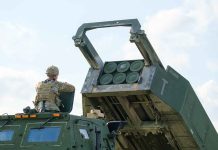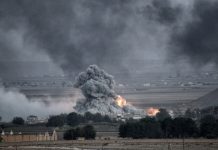
A Ukrainian drone mission transformed from termination to rescue, saving a wounded Russian soldier begging for mercy in the Donbas region.
At a Glance
- Ukrainian drone drops water and surrender instructions to wounded Russian soldier
- Soldier follows drone to Ukrainian lines, collapsing from exhaustion
- Incident highlights complex moral choices in modern warfare
- Ukraine reports capturing 594 Russian POWs in three weeks
- Russian forces accused of war crimes against Ukrainian soldiers
Unexpected Mercy in the Midst of War
In a surprising turn of events on the battlefields of eastern Ukraine, a Ukrainian drone operation intended to eliminate enemy combatants instead became a lifeline for a desperate Russian soldier. This incident, while showcasing unexpected compassion, also raises questions about the effectiveness of Russian military leadership and the stark contrast between Ukrainian and Russian treatment of enemy combatants.
The drama unfolded when a Ukrainian drone, operated by the 54th Brigade’s K-2 Battalion, encountered a wounded Russian soldier who had been hiding in a dugout for seven days following a failed assault. Instead of dropping explosives, the drone operators made the unprecedented decision to offer aid, dropping a water bottle and surrender instructions to the beleaguered soldier.
“Follow the drone at the top of the trenches.”
This simple instruction, delivered via a note, became a lifeline for the Russian soldier, guiding him through the perilous no-man’s land towards Ukrainian lines and potential safety. The incident, captured on video, provides a rare glimpse of humanity amidst the brutality of war, while simultaneously highlighting the stark differences between Ukrainian and Russian military conduct.
A Stark Contrast in Military Ethics
While this act of mercy by Ukrainian forces is commendable, it stands in sharp contrast to the reported behavior of Russian forces. Putin’s military has been accused of numerous war crimes, including the torture and execution of enemy soldiers. These allegations, if true, represent a flagrant violation of the Geneva Convention and basic human rights.
“We adhere to the Geneva Convention and fight with dignity,” the brigade emphasizes.
This incident serves as a powerful reminder of the moral high ground that Ukrainian forces strive to maintain, even in the face of a brutal and often unethical enemy. It’s a testament to the strength of character and discipline instilled in Ukrainian troops, qualities that have undoubtedly contributed to their ability to resist the Russian invasion against overwhelming odds.
The Broader Strategic Picture
Beyond the human interest aspect of this story, there are significant strategic implications to consider. Ukraine’s top commander reported capturing 594 Russian prisoners of war in just three weeks, indicating a potential shift in the tide of battle. This influx of POWs not only provides valuable intelligence but also serves as a powerful propaganda tool, potentially demoralizing Russian forces and encouraging further surrenders.
Additionally, Ukraine’s targeted attacks on Russian ammunition depots, including the destruction of over 58 storage buildings, demonstrate a sophisticated approach to warfare that goes beyond mere frontline engagements. By disrupting supply lines and destroying valuable munitions, Ukrainian forces are effectively degrading Russia’s ability to sustain its offensive operations.
The use of kamikaze drones to obliterate Russian military equipment and ammunition depots further underscores the asymmetric nature of this conflict. Ukraine’s adept use of technology is helping to level the playing field against a numerically superior enemy, proving that in modern warfare, innovation and adaptability can be as crucial as raw military power.
Conclusion: The Changing Face of Warfare
As this conflict continues to evolve, incidents like the drone rescue serve as poignant reminders of the human cost of war and the complex moral choices faced by soldiers on both sides. They also highlight the rapidly changing nature of modern combat, where unmanned aerial vehicles can serve as both weapons of destruction and instruments of mercy.
For conservatives watching these developments, it’s clear that supporting Ukraine’s fight for sovereignty aligns with our values of freedom, self-determination, and ethical conduct in warfare. As we continue to advocate for a strong national defense and strategic foreign policy, we must also recognize the importance of maintaining the moral high ground in conflicts, even against adversaries who show no such restraint.






















